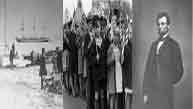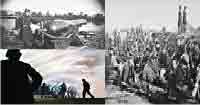|
|
Through Rose-Tinted Specs
Memories of, the 50's
By Roger Turner
Part 1; From Sheffield to Balbriggan |
.......
| The last day of the summer term at Saint Wilfred's Junior School, Sheffield, usually followed the same pattern; we were allowed to bring games and toys from home and spent the morning playing with them in class. Then, as noon approached, we would have a party in the classroom and be visited by our headmaster, Mr McThingy, accompanied by Father Whatever-his-name-was, and his old dog. Once all the food had been devoured, and the speeches were done with we were allowed to go home early if we wished.
Normally after school we boys would play football on the field, or play marbles in the playground, but not today. At least not for me, for I had to rush home to get ready. No train spotting, no standing about chatting, no watching the old men playing bowls at Laycocks Club. For this was one day in the year I did exactly what my mother told me and came straight home.
| 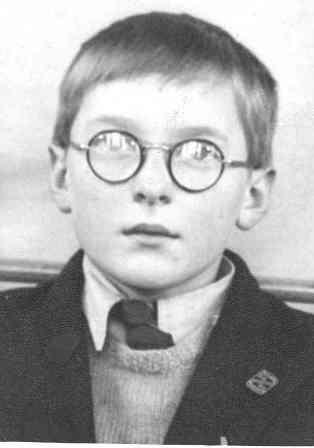
| My mother would get me bathed and ready while our Pat, my big sister brought the cases downstairs. Pat, being eight years older than me, was quite grown up and must have been quite a help to mother.
In the fifties Sheffield people tended to go to places like Bridlington or Blackpool for holidays, nobody we knew went abroad. It just wasn't an option in those days, at least not for the working class. It was also quite normal for many families not even to get a holiday at all. Mother however, had a friend, Eileen McKenna, who had two children, Rory and Rita, both of similar ages to my sister and me, and they lived in this sleepy little Irish town called Balbriggan, just a few miles from Dublin but hundreds of miles from Sheffield. Every year she took us all that way for the whole of the summer holidays. Mother would have been saving up all year for our annual trip to Ireland and would have been down to town a few days before to pay for the tickets.
Even now, I do not know how mother, who was never a well woman, managed to get two children and our luggage all that way, but did it she did. If funds permitted, which was very rare, we would get a taxi to the train station, if not, then we would walk down to Woodseats to catch a tram to the Wicker Arches and then, via a rickety old lift, up to the Victoria Station. | 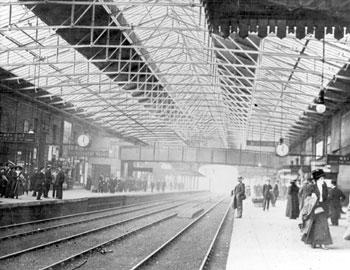
| I should really say something about that station, for it befell the same fate as many English stations did in the late sixties; it fell foul of Dr Beeching's axe, and is no longer used. But in the fifties, I would spend hours at that station with my dad or my big sister when the circus train came to town. It would be shunted into a side platform and the highlight of my year was watching the elephants and other exotic animals being unloaded then being assembled prior to the grand parade. It was always the same, down the slope of the station approach and up through town to where they were going to perform. All very exciting, if somewhat smelly.
But let's get back on track. I loved trains and always carried the right spotting book to record train numbers in. Therefore, mother always kept a close eye on me, fearful that I should wander off and we would miss the train. She needn't fret, as I knew every train time and would listen out to the tannoy. 'The train now arriving at platform three is the three forty-five to Manchester London Road, calling at Penistone, Dunford Bridge...' Before the announcer finished I was there, ready to climb aboard the carriage. This was not just any old train ride, but the first leg of an adventure. The train was hauled by one of the new electric engines powered, like our Sheffield trams, by overhead cables.
By the time we were seated the train was ready to set off over the viaduct and we got a view of Sheffield down below us. Bellowing chimneys filled the air with acrid fumes and smoke that was destined to blacken washing on the lines. Countless houses lined the track and jostled with the factories that provided work for many thousands of people.
Smoothly the train slipped away from the industrial heartland gradually gaining speed as it climbed the gradient toward the beckoning Pennines. As we journeyed on the air gradually became clearer and trackside houses looked in much better condition. Browns and greys became various shades of green as fields in the valley beneath the track soon replaced factories. Crossing viaducts and embankments, the railway hugged the contours of the hillside as the railway passed through the high Pennine towns of Yorkshire, into the gloomy Woodhead Tunnel at Dunford Bridge.
At this point I must make a comparison between steam hauled and electric trains. Steam was, and still is, a wonderful and almost living means of transport, but it could be slow, dirty and often uncomfortable. Electric traction, on the other hand, was smooth, clean and fast, and our train to Manchester on the first day of our adventure, was all this.
Once through the tunnel some wondrous sights greeted us as the train rushed downhill through Lancashire towns and countryside, towards its final destination.
Our train arrived in Manchester bang on time and shortly before the start of the rush hour. Once outside the station, mother hailed a taxi to take us across Manchester for our connection to Liverpool.
What a contrast. This station, I seem to think it was called Manchester Central, was always smelly, dirty and dark. On top of that, the train to Liverpool was the non-corridor type, which meant no toilets.
| 'But I don't want to go, mum.'
'Well,' replied mother, 'if you don't go now, then you won't be wanting any tea, now will you?'
That always did the trick and I braved the smoky, smelly urinal as the quickly as I could.
Non-corridor trains were from a bygone age and we always walked, or in my case ran, to the far end of the train, just behind the engine to find an empty compartment. Once inside it was up to me to deter other passengers from trying to join us. A process of pulling faces, throwing tantrums or even feigning illness achieved this. I would even unhook the strap that lowered the window and stick my head out to tell the world that I felt sick again. I never was though, and once the guard blew his whistle, we would settle down to a nice picnic tea. Well, settle down was the wrong way to put it with me. I doubt if I sat down at all during either train journeys. Sitting down was not, and still isn't one of my better traits. I wish I had a shilling for every time my mother needed to get sooty fleck from my eye with spit and clean handkerchief. My head was always stuck out of the train window. 'Look Mum, Old Trafford... Look Mum, Ship canal... I never stopped until Lime Street appeared on the station nameplate.
I always looked forward to hearing the Liverpool porters who spoke with a nasal laugh in their voices: 'All right, whacker? You bound for the Irish boat?' Mother always kept a few shilling in her pocket for a tip once our baggage was loaded into the waiting bus, and on this occasion she was only too happy to pass one over.
It was only a short trip down to the docks and we were soon passing through the gates of the Mersey Docks and Harbour Board towards the large shed that was the sailing assembly point. Would it be Munster or would it be Leinster? Munster was always my favourite, although I don't remember why.
| Now, if our timing was right we didn't have long to wait before embarking and once we had our tickets inspected, we were ushered up the gangplank to the waiting boat.
Total excitement for me, but not for my sister for as soon as her feet touched the deck, the colour drained from her face. She hated sailing, but not me. I loved that part of the trip most of all.
Sometimes, depending on funds, Mother would have booked a cabin with the hope of getting some sleep. Fat chance with me about. I was up and down like the yo-yo I kept in my jacket pocket.
No, a cabin and a nice warm bunk was a waste of money for me so invariably we would settle down in one the lounges. Settle down? Not me! Far too much to do and see. The first thing was for me to check that we were on the right boat, and that meant looking for the nameplate next to the Purser's office. Next job was to look up at the Liver Birds on the building behind the Princess dock and see if I recognised any seagulls. (Seagulls would often follow the boat, occasionally landing on the rails for a chat when their wings got tired.) Then I had to make sure the Belfast boat had not sailed yet. Yes, there she is on the fare side of the dock. I never knew what that boat was called, but whatever it was, it couldn't hold a candle to the Munster. I would then count the lifeboats and check the lashing on the upturned rafts that doubled as seats on the upper decks.
One thing that always fascinated me was the lights that were attached to the rafts would only work when turned upwards so the all had to be checked. Any found not working were reported to the first member of the crew I happened across. God only knows what they thought of me!
Getting a boat like this one ready for sea was quite an important task for me and I would wonder who did the job when I wasn't travelling.
Mother and our Pat would, by now, have made themselves comfortable and had long since learnt that the easiest thing was to let me tire myself out. Believe me when I tell you that never happened!
As departure time approached, excitement swelled within me. I loved watching the stevedores removing the gangplanks and untying the thick ropes that held us against the dock.
Gradually the throb of the engines became stronger and slowly the giant propellers would stir up the rubbish in the dock and we were off. At a snail's pace we edged away from the dock and through the maze of other docks until we arrived in the lock. Now, depending on the state of the tide, the boat would slip down the lock exposing slime-covered walls. When the levels were equal, the front doors would swing open to let us out into the murky waters of the Mersey. The throb of the engines increased and we slipped smoothly out into the river.
On the south bank I watched the twinkling lights of Birkenhead, New Brighton and Wallasey pass by as we gathered momentum and headed out to sea. I would stay on deck until the last speck of electric light vanished from my view. After a quick check on my wristwatch to see if we were on time I was off below deck again to inform my mother and sister of our progress.
'Anything left to eat, Mum?' She always had. Don't you want anything to eat, our Pat?' She never did. She was far too ill to eat so it was left to me finish off the food. I never could stand waste. 'Nice cake this, our Pat.' I would say to her with crumbs spilling from my mouth.
'Tell him to go away, mum!' Pat would say, looking rather upset. I could never understand why she was ill when we went to Ireland. I never was.
'Stop annoying your sister, and settle down.'
Fat chance. It was time for my next inspection.
I was up and down all night long. I could tell when the current changed as we passed the Isle of Man and I would be in position to observe the lights that twinkled off the starboard side. One of my other tasks was to keep an eye out for other boats. Sometimes I would be lucky and would write down the time in my little book. I wonder what happened to my spotting books?
Occasionally I would go back to mother and our Pat for a rest, but once I was warm again off I would go.
I was never shy and would talk to the crew, asking them all sorts of questions. I remember one year there was a gale blowing and the boat was being tossed about all over the sea. Everyone, including the crew, was ill, that is apart from little me. Our Pat was in a right state when we finally docked many hours late.
Some of the crew would talk and show me various parts of the boat, and over the years I visited the engine room, the radio room and up to see the captain on the bridge. It was all very exciting to a little lad.
As the first fingers of daylight appeared, I would be as far forward as I was allowed, searching the horizon for the first signs of land.
It was about now that the boat started to swing back to life; Crew moved around with a sense of purpose, Shutters were opened, Waiters clattered plates and cutlery, Chefs filled the air with the smell of cooking bacon. God, I don't half feel hungry! But I was lookout duty and could not leave my post.
An increase in the number of seabirds meant that Ireland's Eye and Howth Head would soon come into view and it would't be long before we slipped into the Dublin Bay channel. Out of my pocket would come my little binoculars and I would search the horizon until land was sited. 'YES! Well, perhaps, it could be?' I carried on searching the horizon. 'Yes! Land ahoy. Three points of the starboard bow. Must go and tell Mum.' Dash below deck and shake my mother from her sleep. 'Mum, we're nearly there. Time to get ready.' Shake our Pat. 'Time for breakfast, our Pat!'
'Shut up and go away!' She was never happy in the morning, our Pat.
Mother by now would have started to stir and soon she and I would have been eating breakfast, but not our Pat, miserable sod, she wouldn't even come in to restaurant with us. You know, over the years, our Pat must have tried every remedy know to man to prevent her becoming seasick; Barley sugar stuffed in her ears, Mothballs in her socks, Garlic hung round her neck, she tried the lot, but they all failed.
Once I had eaten, it was back on duty one again and I stayed at my post, off and on, until we tied up on the north wall.
Dublin, from the sea, was a wonderful sight to a little lad from Sheffield, and from my vantage point I watched in awe as we steamed towards it. Passing marker-buoys that swayed in our wash and bobbled the bell on top. Now we were in the channel the next thing was to sweep past the wall of the port side that told me we were now in the river. Ahead of us, sunlight reflected in window whilst our resident flock of gulls squawked vociferously behind us.
| 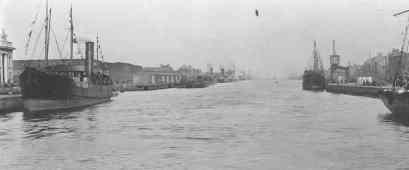
| Below decks, the activity was frenetic. Luggage was brought up to the deck and families assembled together, but not ours, because I was far too busy and our Pat far too ill. Slowly but surely, the throb of the engines slackened as speed was reduced, and soon we were beside the north wall. Stevedores appeared on the quayside, caught ropes cast down from the boat and tied them to the bollards. Gangplanks were pushed into place and secured to the boat.
Mother took a firm hold of my collar and ushered us along into the customs shed. Now there's a job I always wanted. Customs officer. He shoved a notice in front of us and tapped his finger on my little case. 'Have you anything to declare?'
'You asked me that last year,' I replied. 'Look.' I pointed to the faded chalk mark on my little case.
He looked at my mother. 'You'll be English, then?'
'That's correct, Sir.' Mother was always polite. 'Will you be wanting to look in our cases?' She fumbled in her handbag for the keys and unlocked the big case.
'You'll be here on holiday, then?' the customs man asked as he ran his fingers through the clothes in my mother's case.
'That's correct, Sir.'
The customs man pressed the lid of the big case down, smiled at my sister, and put his chalk mark on all our cases. 'Have a nice holiday, now.' And off he moved to the find his next victim.
An English woman with two children in tow very rarely had any trouble at the customs point. They were after bigger fish. Not that we were totally innocent. If he had opened my little case he would have found a couple of pounds of tea or a big tin of coffee. We would bring in items in short supply in Ireland and take back items in short supply in Sheffield. Free trade they now call it.
------------
On the North wall were taxis and busses waiting to take passengers into the city, and usually we had time to take the bus, but if we had been delayed then a quick taxi ride to the bus station was the order of the day to catch the Dundalk bus.
To an English kid in the fifties, Dublin looked a wonderful city, and nothing like Sheffield. No bombsites. Smart houses with real iron railings in front of them. (Our railings had gone during the war to make battleships) Most of all, Dublin was clean.
Now, Irish buses were something else in the fifties and ours was always a single-decker with a curved back and a ladder that led up to the roof. If the bus had been full, then our cases would have been put up there, but it never was, so the cases came on board with us.
By now, I was starting to tire, and would fall fast asleep once on the bus, but as it sped north from the city, I would get a new lease of life and take an interest in the surroundings. Green fields took over from houses and occasionally the bus would stop miles from nowhere to pick someone up. And it wasn't just people the bus carried. It took packages from one village to the next, bicycles up on the roof, dogs, cats, goats, hens, sheep and boxes of vegetables... the list was endless. And if the driver saw one of his cronies he would stop the bus for a chat. No wonder it never ran on time. I bet it doesn't happen nowadays. | 
| Eventually the bus passed the church and stopped to let us off on Dublin Street and right opposite Market Green. Any tiredness in me had vanished and seasickness was distant memory for our Pat, but all our mother wanted was a sit down and wet of tea.
Our annual six-week stay in Balbriggan was just about to begin...
To Be Continued...
| 
|
|
